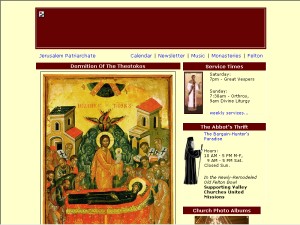St Lawrence Orthodox Christian Church
St Lawrence Orthodox Christian Church
6192 Highway 9
Felton, CA 95018
6192 Highway 9
Felton, CA 95018
Category: Churches
Orthodoxy is not just a kind of Roman Catholicism without the Pope, but something quite distinct from any religious system in the west. Yet those who look more closely at this "unknown world" will discover much in it which, while different, is yet curiously familiar. "But that is what I have always believed!" Such has been the reaction of many, on learning more fully about the Orthodox Church and what it teaches; Most important of all, in many different communions during the present century there has grown up a compelling and unprecedented desire for the visible unity of all Christians, and this has given rise to a new interest in the Orthodox Church. The Orthodox Church is a family of self-governing Churches. It is held together, not by a centralized organization, not by a single prelate wielding absolute power over the whole body, but by the double bond of unity in the faith and communion in the sacraments. Each Church, while independent, is in full agreement with the rest on all matters of doctrine, and between them all there is full sacramental communion. Orthodoxy claims to be universal — not something exotic and oriental, but simple Christianity. Because of human failings and the accidents of history, the Orthodox Church has been largely restricted in the past to certain geographical areas. Yet to the Orthodox themselves their Church is something more than a group of local bodies. The word "Orthodoxy" has the double meaning of "right belief" and "right glory" (or "right worship"). The Orthodox, therefore, make what may seem at first a surprising claim: they regard their Church as the Church which guards and teaches the true belief about God and which glorifies Him with right worship, that is, as nothing less than the Church of Christ on earth.
Keywords: Orthodox, Orthodoxy, Eastern Christianity, Russian Orthodox, Greek Orthodox, Philokalia, Nicene Fathers
Keywords: Orthodox, Orthodoxy, Eastern Christianity, Russian Orthodox, Greek Orthodox, Philokalia, Nicene Fathers
Customer Reviews for St Lawrence Orthodox Christian Church
Be the first to review St Lawrence Orthodox Christian Church - Use the thumbs to get started!
St Lawrence Orthodox Christian Church has not yet completed their interview.


